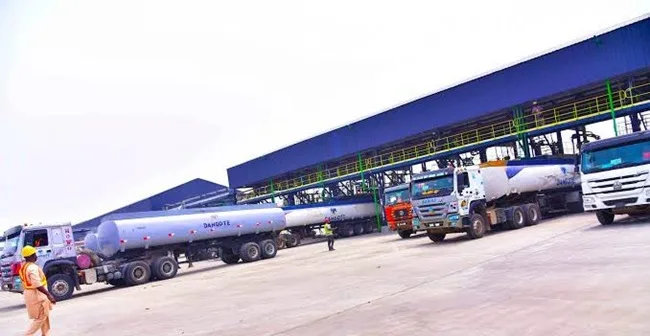The Dangote Refinery has announced a reduction in the ex-depot price of petrol from N990 to N970 per litre.
While the change aims to alleviate financial strain on Nigerians, it has elicited mixed reactions across the country. Citizens and experts share their perspectives on what this means for the economy and everyday life.
Join our WhatsApp ChannelA Step Towards Relief By Dangote Refinery
The decision was disclosed in a statement by Anthony Chiejina, the group chief branding and communications officer of Dangote Group. He said, “This is our way of appreciating the good people of Nigeria for their unwavering support in making the refinery a dream come true.”
Chiejina added that the refinery remains committed to ensuring high-quality, sustainable products while continuing to meet the nation’s fuel demands.
Experts believe this reduction reflects the refinery’s effort to address public concerns about rising costs. “The move is a strategic step toward regaining public trust and demonstrating the local capacity to refine petroleum products,” said energy analyst Dr. Adebayo Olayemi.
Citizens Speak Out
Opinions among Nigerians remain divided over the significance of the price adjustment.
For business owner Daniel Christian in Lagos, the reduction is welcome news. “Even though it’s just N20, it adds up for those of us who buy in bulk for generators. At least it shows they are listening,” Musa said.
Another Lagos resident and teacher, Mary Johnson, had a more cautious take. “The price cut is good, but we need consistency. Today it’s N970; tomorrow, who knows? Stability in pricing matters more to us,” she noted.
Okada rider Aliyu Garba in Isolo, Lagos expressed skepticism. “This reduction is nothing compared to what we’re spending on petrol daily. It’s a drop in the ocean,” he remarked, highlighting the persistent burden of high transportation costs.
For Port Harcourt-based graduate, Boma Emenike, the cut could be a positive sign. “It shows that Dangote Refinery is listening to Nigerians. I hope this will eventually lead to further reductions,” Emenike said.
READ ALSO: Dangote Refinery: Revolution Or Restriction For Nigeria’s Oil Market?
Trader Ifeoma Okeke from Yaba remained indifferent. “N20 is not a big difference. What we need are policies that reduce the cost of everything, not just fuel,” she argued.
Expert Insights on the Price Cut By Dangote Refinery
Economist Dr. Tunde Akinwumi weighed in on the broader implications of the price reduction. “This adjustment might not seem significant, but it could influence the cost of transportation and goods, especially in rural areas. If sustained, it may reduce inflation marginally,” he said.
However, energy expert and policy analyst Grace Ihejirika warned that the price cut alone might not have the desired economic effect. “Without a corresponding reduction in other sectors like logistics and manufacturing, the impact will be limited. The government needs to work with private refineries like Dangote to create a comprehensive strategy,” she explained.
Tackling Fuel Supply Concerns
The refinery’s announcement comes amid fears of potential fuel shortages. Chiejina assured Nigerians of adequate supply, stating, “We are determined to keep ramping up production to meet and surpass our domestic fuel consumption, dispelling any fear of a shortfall.”
This reassurance is critical as Nigeria strives for self-sufficiency in petroleum refining. Dangote Refinery, the largest single-train refinery globally, has already reduced the country’s dependence on imported fuel.
Broader Economic Impact
The price reduction is expected to ripple across the Nigerian economy, particularly in transportation and small-scale businesses reliant on fuel. Yet, the challenge remains translating this cut into tangible relief for consumers.
Many Nigerians still face high living costs due to inflation. Energy costs are a critical component, and any change directly affects household expenses and business operations.
The Dangote Refinery’s decision to lower the petrol ex-depot price has stirred mixed reactions among Nigerians. While some view it as a step in the right direction, others question its adequacy in addressing the broader economic challenges. Experts agree that the price cut is a positive move but emphasize the need for sustained efforts to stabilise the fuel market and create a more comprehensive approach to economic relief.
As Nigerians adjust to this change, the spotlight remains on Dangote Refinery’s role in shaping the country’s energy landscape and its commitment to easing the burden on citizens.
Emmanuel Ochayi is a journalist. He is a graduate of the University of Lagos, School of first choice and the nations pride. Emmanuel is keen on exploring writing angles in different areas, including Business, climate change, politics, Education, and others.
- Emmanuel Ochayihttps://www.primebusiness.africa/author/ochayi/
- Emmanuel Ochayihttps://www.primebusiness.africa/author/ochayi/
- Emmanuel Ochayihttps://www.primebusiness.africa/author/ochayi/
- Emmanuel Ochayihttps://www.primebusiness.africa/author/ochayi/


















Follow Us